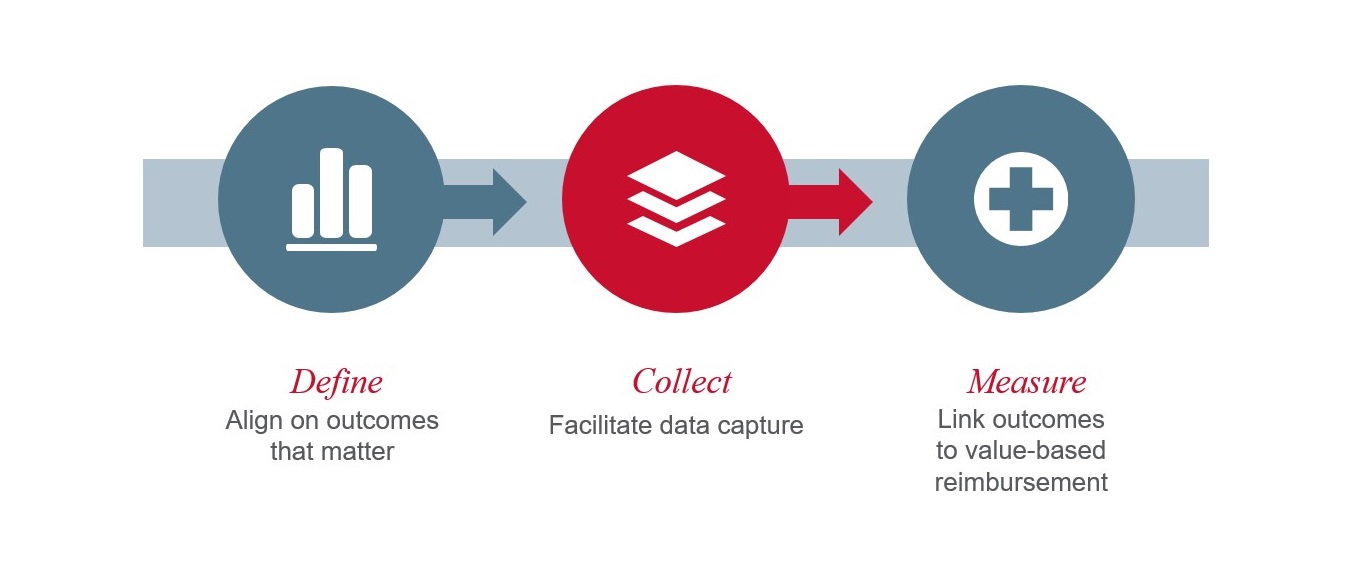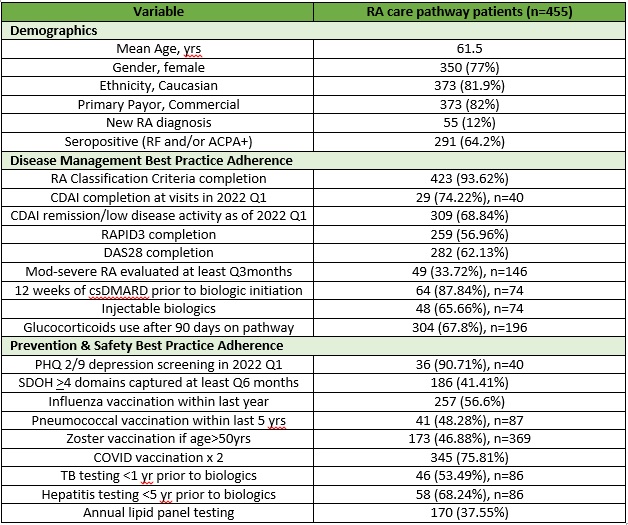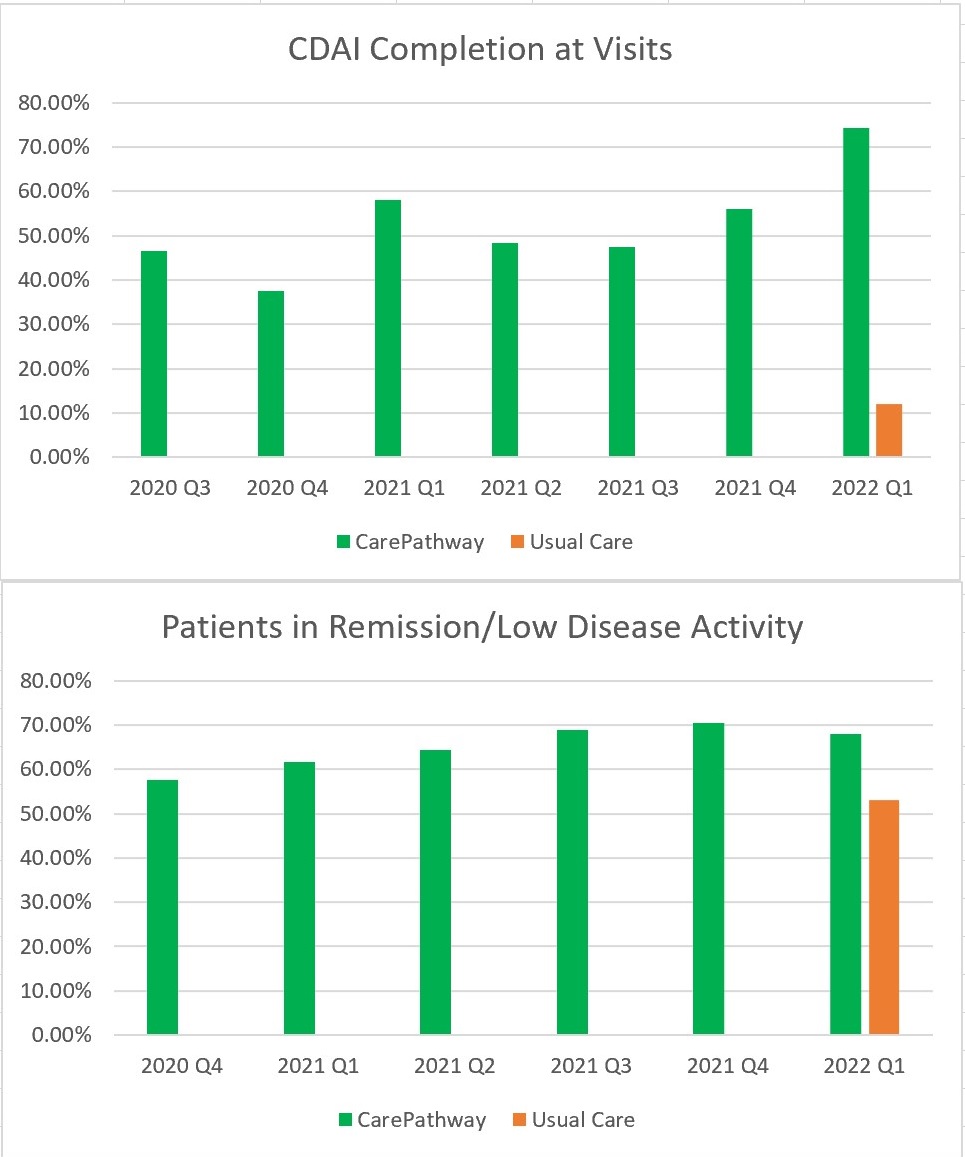Back
Poster Session A
Epidemiology, health policy and outcomes
Session: (0056–0084) Health Services Research Poster I: Lupus, RA, Spondyloarthritis and More
0065: Rheumatoid Arthritis Clinical Care Pathway Implementation: A Step Towards Improved Outcomes and Value-Based Care
Saturday, November 12, 2022
1:00 PM – 3:00 PM Eastern Time
Location: Virtual Poster Hall
- TS
Tarun Sharma, MD
Allegheny Health Network
Pittsburgh, PA, United States
Abstract Poster Presenter(s)
Tarun Sharma1, paul lebovitz1, chetan rajput2, Lori Mcaninch3, ellen Kraemer3, izabela Stanescu3, adam dore1, joseph ahearn3 and Susan Manzi4, 1Allegheny Health Network, Pittsburgh, PA, 2Highmark Health, Pittsburgh, 3Allegheny Health Network, Pittsburgh, 4Allegheny Health Network, Lupus Center of Excellence, Wexford, PA
Background/Purpose: Care transformation in a chronic illness like RA requires delivery of health care services through a patient-centric care model. Within an integrated delivery and finance system, our first step towards the goal of RA care transformation and a shift to value-based care included implementation of a multi-faceted RA clinical care pathway.
Methods: At the Allegheny Health Network Autoimmunity Institute, RA care transformation efforts started in 2020 Q1 by an expert panel attempting to answer the fundamental question: what does the ideal RA care look like from a patient perspective, and how do we strive to achieve it with every patient encounter? Consensus based best practices were derived and a RA care pathway was designed with 3 major focus areas: alignment on outcomes that matter, such as disease activity, functional and quality measures (definition phase, 2020 Q1), followed by process design and implementation of prospective data capture tools (collection phase, 2020 Q2-3), and ultimately measurements with linkage to population health and value-based care (metric dashboards, 2020 Q3 - current) (Figure 1). The primary aim of this study was to measure adherence to the RA care pathway best practices (table 1, target 80%), and to identify opportunities for improvement in the process. Secondary aim was to evaluate whether pathway adherence leads to improved clinical outcomes compared to usual care. A major patient-centric aspect of our care pathway included the focus on productive interactions between an informed, activated patient (via patient education), and a prepared, proactive practice team (RA nurse navigator, clinical pharmacist, behavioral health specialist, registered dietician, and social worker). Quarterly performance metrics were transparently shared at monthly faculty and staff meetings.
Results: Currently the RA care pathway includes 455 patients, including 55 patients that were newly diagnosed with RA since launching pathways. Eight patients were excluded due to relocation or loss of follow up. Patient demographics and overall dashboard metrics are detailed in table 1. Clinical Disease Activity Index (CDAI) measurement and proportion of patients in remission/low disease activity were higher compared to upon pathway entry and compared to usual care sites (Figure 2). Performance was noted to be below the target especially in the prevention/safety performance metrics, therefore an immunization campaign was launched at our clinical sites in 2022 Q1 with help of our clinical pharmacist, and efforts on staff re-education to better capture SDOH domains are underway.
Conclusion: We found that routine measurement of RA best practice metrics could help identify opportunities for care improvement. Implementation of a RA Care Pathway comprising of management best practices and a team-based care approach may be superior to usual care. We have implemented SDOH re-education and immunization campaigns in an effort to improve performance in the prevention and safety domains, and introduced nursing touchpoints between visits for patients with moderate-severe RA. Longitudinal data collection, and including patient experience, cost, and utilization data are among our next steps towards value-based care.
 Figure 1. Three Focus Areas of the RA Care Pathway Initiative
Figure 1. Three Focus Areas of the RA Care Pathway Initiative
 Table 1. RA Care Pathway Performance Metrics
Table 1. RA Care Pathway Performance Metrics
 Figure 2. Comparison of Trends of CDAI Completion at Visits and Remission/Low Disease Activity in Patients in RA Care Pathway vs Usual Care
Figure 2. Comparison of Trends of CDAI Completion at Visits and Remission/Low Disease Activity in Patients in RA Care Pathway vs Usual Care
Disclosures: T. Sharma, None; p. lebovitz, None; c. rajput, None; L. Mcaninch, None; e. Kraemer, None; i. Stanescu, None; a. dore, AbbVie/Abbott, Exagen; j. ahearn, None; S. Manzi, AstraZeneca, GlaxoSmithKline (GSK), Exagen Diagnostics Inc, AbbVie, HGS, Cugene, Lilly, UCB Advisory Board, Lupus Foundation of America.
Background/Purpose: Care transformation in a chronic illness like RA requires delivery of health care services through a patient-centric care model. Within an integrated delivery and finance system, our first step towards the goal of RA care transformation and a shift to value-based care included implementation of a multi-faceted RA clinical care pathway.
Methods: At the Allegheny Health Network Autoimmunity Institute, RA care transformation efforts started in 2020 Q1 by an expert panel attempting to answer the fundamental question: what does the ideal RA care look like from a patient perspective, and how do we strive to achieve it with every patient encounter? Consensus based best practices were derived and a RA care pathway was designed with 3 major focus areas: alignment on outcomes that matter, such as disease activity, functional and quality measures (definition phase, 2020 Q1), followed by process design and implementation of prospective data capture tools (collection phase, 2020 Q2-3), and ultimately measurements with linkage to population health and value-based care (metric dashboards, 2020 Q3 - current) (Figure 1). The primary aim of this study was to measure adherence to the RA care pathway best practices (table 1, target 80%), and to identify opportunities for improvement in the process. Secondary aim was to evaluate whether pathway adherence leads to improved clinical outcomes compared to usual care. A major patient-centric aspect of our care pathway included the focus on productive interactions between an informed, activated patient (via patient education), and a prepared, proactive practice team (RA nurse navigator, clinical pharmacist, behavioral health specialist, registered dietician, and social worker). Quarterly performance metrics were transparently shared at monthly faculty and staff meetings.
Results: Currently the RA care pathway includes 455 patients, including 55 patients that were newly diagnosed with RA since launching pathways. Eight patients were excluded due to relocation or loss of follow up. Patient demographics and overall dashboard metrics are detailed in table 1. Clinical Disease Activity Index (CDAI) measurement and proportion of patients in remission/low disease activity were higher compared to upon pathway entry and compared to usual care sites (Figure 2). Performance was noted to be below the target especially in the prevention/safety performance metrics, therefore an immunization campaign was launched at our clinical sites in 2022 Q1 with help of our clinical pharmacist, and efforts on staff re-education to better capture SDOH domains are underway.
Conclusion: We found that routine measurement of RA best practice metrics could help identify opportunities for care improvement. Implementation of a RA Care Pathway comprising of management best practices and a team-based care approach may be superior to usual care. We have implemented SDOH re-education and immunization campaigns in an effort to improve performance in the prevention and safety domains, and introduced nursing touchpoints between visits for patients with moderate-severe RA. Longitudinal data collection, and including patient experience, cost, and utilization data are among our next steps towards value-based care.
 Figure 1. Three Focus Areas of the RA Care Pathway Initiative
Figure 1. Three Focus Areas of the RA Care Pathway Initiative Table 1. RA Care Pathway Performance Metrics
Table 1. RA Care Pathway Performance Metrics Figure 2. Comparison of Trends of CDAI Completion at Visits and Remission/Low Disease Activity in Patients in RA Care Pathway vs Usual Care
Figure 2. Comparison of Trends of CDAI Completion at Visits and Remission/Low Disease Activity in Patients in RA Care Pathway vs Usual Care Disclosures: T. Sharma, None; p. lebovitz, None; c. rajput, None; L. Mcaninch, None; e. Kraemer, None; i. Stanescu, None; a. dore, AbbVie/Abbott, Exagen; j. ahearn, None; S. Manzi, AstraZeneca, GlaxoSmithKline (GSK), Exagen Diagnostics Inc, AbbVie, HGS, Cugene, Lilly, UCB Advisory Board, Lupus Foundation of America.

